We’ve barely had a chance to shout “Woohoo!” but some Hydro Alliance researchers have hit the ground running, submitting proposals for hydro-related research. In response, the WHA Steering Committee suggested an ad-hoc Research Committee be set-up to read and assess these early research proposals. A more formal process is being set up for Fall 2016, but in the mean time we are very excited to share with you three projects that have been approved.
Future Revenue Sharing Initiatives for Manitoba Hydro and the Government of Manitoba
Researchers: Melanie O’Gorman & Rosa Sanchez
Funding: $8,100



The dams more recently constructed by Manitoba Hydro have involved partnerships with First Nations communities. These partnerships and the other compensation deals that have been negotiated by Manitoba Hydro do not address the socio-economic problems present in most hydro-affected communities, including housing shortages, mass unemployment, poverty and food insecurity (Loney, 1995). A new approach for hydroelectric benefit-sharing is needed that would work towards bringing the socio-economic developments that affected First Nations desire. Such benefit-sharing would involve payments on an annual basis to all hydro-affected communities and individuals.
This project will estimate four potential sources of revenue for financing regular, global benefit-sharing. These sources are river rental revenue, profit-sharing with Manitoba Hydro, a dedicated hydroelectric rate increase and a heating subsidy scheme. In addition to estimating these potential revenue sources, this research project will complete socio-economic profiles of a number of communities that have been deeply affected by Manitoba Hydro projects, and provide an illustration of what such revenue could achieve in these communities. Findings will be shared within the Wa Ni Ska Tan Hydro Alliance (WHA) and to the communities affiliated with the WHA.
Financial Inclusion & Hydro Research Trip

Researcher: Jerry Buckland
Funding: $1,200
From July through December 2016 Jerry Buckland is on a 6-month research leave from Canadian Mennonite University’s Menno Simons College. He is working on various projects including a 6-week research tour in Australia to explore efforts there to promote Indigenous Financial Inclusion (an area of research that looks at the causes and consequences of having little or no access to mainstream banking) and Indigenous co-management of natural resources.
From November he will be a Visiting Professor with the School of Economics, Finance and Marketing in the College of Business at RMIT University, Melbourne. In Melbourne he will visit various Indigenous financial inclusion projects. There is a lot of activity in the field of Indigenous financial inclusion in Australia, it has relevance to the Canadian context, but there is limited comparative analysis of Canada-Australia financial inclusion.
Since 2013, Jerry has also been involved in research and regulatory hearings examining Indigenous Peoples’ involvement in hydro-dams in Northern Manitoba. Indigenous Peoples world-wide have often been harmed, and generally not benefited from hydro development, including in Canada and Australia. The study tour will provide an opportunity to share the work of the Wa Ni Ska Tan Hydro Alliance with Australian researchers and explore the hydro issues facing Australia and their responses to these large development projects. A specific focus will be the co-management of natural resources. Jerry will be visiting the Cape York Resource Management Organization in Cairns that is active in innovative co-management of natural resources.
The Manitoba Hydro Graphic Novel
Researchers: Ad Astra Comix (Nicole Burton & Hugh Goldring) with Peter Kulchyski
Funding: $19,900


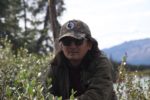
This project will produce a high-quality, full-length graphic novel (a long-form comic book) about the impact of hydroelectric development in Manitoba’s northern communities and the people who live there. This graphic novel will tell the story of a fictional occupation below the dam at Grand Rapids with people coming from hydro-affected communities all over the north. This story is meant to be a narrative device for putting indigenous people at the centre of the story. It will be accessible to readers 12 and up, and serve to provide a valuable record of community and even family experiences. The stories told in the graphic novel will be produced in partnership with the Hydro Alliance Committee to ensure the greatest possible accuracy. It will also act as an educational tool for Southern communities unfamiliar with the impacts of hydro development in the north.
Below is an example of previous work by Ad Astra Comix: A Cree/English children’s book published by the Manitoba First Nations Education Resource Centre.
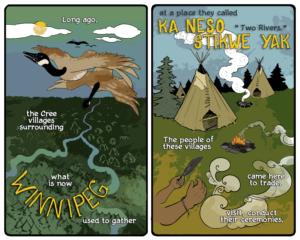
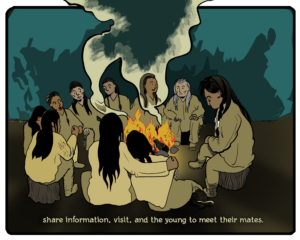
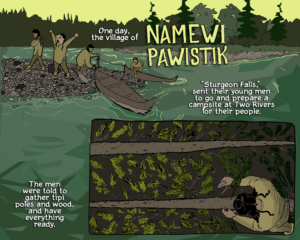
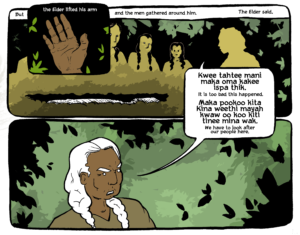
PhD Research: “Where the Otters Play” to “Horseshoe Bay”: Hydro Electric Generations and Footprints in Northern Manitoba (working title)
PhD Candidate: Ramona Neckoway
Funding: $20,000
 Ramona’s doctoral work focuses on the impacts and effects of hydro-electric system in northern Manitoba. One component of her research aims to chart the growth of this system. Another aspect involves documenting perspectives on the system as understood and experienced by Ithinewuk who have been directly affected by it. This research is a work in progress and the direction of the research may continue to evolve and transform.
Ramona’s doctoral work focuses on the impacts and effects of hydro-electric system in northern Manitoba. One component of her research aims to chart the growth of this system. Another aspect involves documenting perspectives on the system as understood and experienced by Ithinewuk who have been directly affected by it. This research is a work in progress and the direction of the research may continue to evolve and transform.

